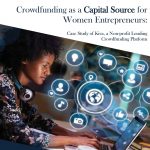Crowdfunding as a Capital Source for Women Entrepreneurs: Case Study of Kiva, a Non-profit Lending Crowdfunding Platform 
A2F Consulting for National Women’s Business Council
First published March 2018
Crowdfunding is emerging as a scalable source of capital and a viable alternative to traditional sources of finance. It can help small businesses grow by providing them with capital that might otherwise not be available. In particular, crowdfunding can help women entrepreneurs with their needed capital as studies often report that women comparatively face more challenges in meeting their capital needs in traditional capital markets. Therefore, it is crucial for female entrepreneurs to be informed about these new sources of capital, understand the dynamics of borrowing, as well as the role of lenders in different types of crowdfunding. More importantly, this report will provide insights into the prevalent characteristics of successful crowdfunding campaigns.
As a potential contributor to women’s success on crowdfunding platforms, the social network emerged as a major factor from the literature. Studies often suggest that women tend to have larger and closer social networks but smaller professional networks. While the latter is more important for business-related pursuits, it is plausible, that the social network overall is more relevant for crowdfunding success. However due to limited data availability, as well as the novelty of the topic to date, very little is known about the role of the social network in facilitating success on crowdfunding platforms.
This research seeks to provide a deeper understanding of the dynamics of the successful crowdfunding on Kiva, a non-profit lending crowdfunding platform based in the U.S. It investigates whether a larger social network will increase the likelihood of women’s success on Kiva in comparison to their male counterparts. To this end, using a novel dataset received from Kiva for the period between 2011 and 2017, a series of multiple logistic regression analysis was conducted. These analyses were coupled by iv comprehensive descriptive analysis to better distill and describe the gender dynamics, as well as the relationship between women’s success and crowdfunding variables on Kiva.
Download Resource